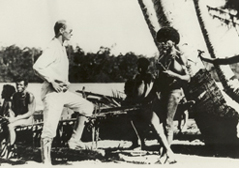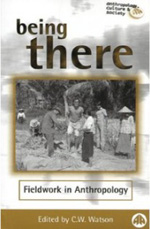Fieldwork

What is fieldwork?
The term ‘fieldwork’ is used to describe reserach in all areas of anthropology from social and cultural anthropology to medical or biological anthropology. The practice of ‘fieldwork’ can be done in a variety of different settings such as an urban or virtual environment, a small tribal community, a museum, library, cultural institution, business, or a primate conservation area.
Have anthropologists always engaged in fieldwork?
There is a general consensus amongst anthropologists today that fieldwork came to be considered part of the practice of social anthropology with the work of one of the founding fathers of British anthropology, Bronislaw Malinowski. Unlike the ‘armchair anthropologists’ before him, Malinowski advocated, instead of studying other peoples from the comfort of university libraries, going ‘into the field’: that is, living with the people he was studying, engaging in their community, learning their language, eating their food, and taking part in their everyday life. Since Malinowski’s time, fieldwork – traditionally, away from one’s own society – has been regarded as an essential and necessary part of an anthropologist’s professional training. Fieldwork over an extended period – typically 1-2 years - has been thought of as particular to social anthropology, and part of what distinguishes the discipline from other social sciences. Today, some anthropologists still consider that doing fieldwork in the traditional Malinowskian sense is an essential and distinguishing aspect of anthropological research. Others see fieldwork as encompassing a wide variety of practices in different settings, and as one of many different methods by which anthropologists can gain intimate knowledge of a community. Fieldwork itself is increasingly practised in highly contemporary settings, as well as the more traditional ‘remote’ ones.
Why is it important to anthropology?
Fieldwork is among the most distinctive practices anthropologists bring to the study of human life in society. Through fieldwork, the social anthropologist seeks a detailed and intimate understanding of the context of social action and relations. Fieldwork in a previously unfamiliar setting has among its aims a deep understanding that encompasses as much as possible of an ‘insider’s’ perspective. Conducted in a more familiar setting, it can lead the anthropologist – and those for whom he or she writes – to look at everyday reality in new and unexpected ways.
Where fieldwork is conducted within museums, archives, or cultural institutions, the process can be similar in that the social anthropologist seeks to understand the underlying symbolic and cultural meanings of a text, or a collection of objects. Equally, biological anthropologists frequently base research projects on human remains or artefacts held in museum collections.
What types of fieldwork do anthropologists undertake?
Fieldwork can take many different forms, shaped by factors such as: the topic of investigation, questions guiding the research, where the research will be carried out, who is funding it, external political or economic factors, the age, sex or ethnicity of the anthropologist, the technological facilities available. Newer formats for research, such as use of multiple sites and the study of large-scale centres of power such as intergovernmental organisations, are becoming increasingly common; as is the use of visual technologies and methods of presentation such as film, photography and digital media.
What are some of the fieldwork methods anthropologists adopt?
Anthropologists may assemble data in numerous ways. They may gather quantitative information by conducting surveys or analysing records such as historical archives, government reports and censuses. Quantitative data is often useful for biological anthropologists in mapping physical traits within a population, or making cross-population comparisons. Quantitative information is also useful and often necessary when anthropologists work on interdisciplinary projects with other specialists. However, for the most part social anthropologists concentrate on gathering qualitative data. They do so by conducting individual and group interviews, by undertaking oral histories, through online discussion forums and, most importantly, through the Malinowskian tradition of ‘participant observation’.
Participant observation enables the social anthropologist to undertake detailed, lengthy and often complex observations of social life in fine detail. It may be directed to such disparate groups as a virtual network, a tribal village, or an activist group in an urban environment. By participating in the fabric of daily life as well as more formal ceremonies and rituals, and discussing his/her developing ideas with willing members of the community (sometimes termed ‘informants’) the fieldworker builds up a progressively deeper understanding of what is happening. Many fieldworkers find this a personally transforming experience.
A variant of participant observation also exists within biological anthropology, where primatologists may analyse the social dynamics of a monkey or ape society by spending long periods observing the group and being to some extent accepted by it. However, the crucial difference is that only human beings can talk to the anthropologist and reflect on their society through language.
What do anthropologists do with the material they have collected?
Anthropologists may write up their data in reports, articles, or journal contributions. Where the project is interdisciplinary or team-based, these may be co-authored. Alternatively, they may describe their experiences and findings in the form of an ethnography.
Recommended Resources
Films
Doing Anthropology - a film about anthropologists from MIT undertaking fieldwork in different social contexts.
Anthropological Fieldwork in a Gurung village – Professor Alan Macfarlane speaks of his fieldwork in the Himalayas.
 Strangers Abroad Series – Central Television’s major documentary series directed by anthropologist Andre Singer and presented by Bruce Dakowski. The series looks at the first anthropologists to move away from ‘armchair theorising’ and go out to live among the people who are interested them.
Strangers Abroad Series – Central Television’s major documentary series directed by anthropologist Andre Singer and presented by Bruce Dakowski. The series looks at the first anthropologists to move away from ‘armchair theorising’ and go out to live among the people who are interested them.
The series includes:
• Sir Walter Baldwin Spencer: Fieldwork
• Franz Boas: The Shackles of Tradition
• William Rivers: Everything is Relatives
• Bronislaw Malinowski: Off the Veranda
• Margaret Mead: Coming of Age
• Sir Edward Evans-Pritchard: Strange Beliefs
The series is distributed by the Royal Anthropological Institute. For more information visit https://raifilm.org.uk/
General
http://filonetwork.wordpress.com – FiLo is a researcher run and inspired network, that aims to bring together researchers who have chosen London as their field site.
http://www.stanford.edu/~popolvuh/field-checklist.htm#time-sensitive –a very comprehensive checklist of things to bring when going off to do fieldwork, written by James A. Fox (Stanford University).
Funding
Look at our webpage on postgraduate programmes for more information on research funding opportunities.
Books



Anthropological Practice: Fieldwork and the Ethnographic Method
Okely, J. ( Berg Publishers, 2011)
Ethnographic Fieldwork: An Anthropological Reader
Edited by Antonius C.G. M. Robben and Jeffrey A. Sulka (Wiley-Blackwell, 2006)
Being There: Fieldwork in Anthropology (Anthropology, Culture and Society)
Watson,C. W. (Pluto Press,1999)
Articles
http://www.dur.ac.uk/anthropology.journal/vol12/iss1/kaul/kaul.html - reflections on fieldwork in a tourist destination.
https://www.mmg.mpg.de/46801/blog-wessendorf-fieldwork - Doing Research with Busy People by Susanne Wessendorf of the Max Planck Institute.
https://www.anthropologymatters.com/index.php/anth_matters/article/view/70 - Doing Fieldwork in Eastern Europe (Anthropology Matters Journal, 2006, Vol.8 (1).

